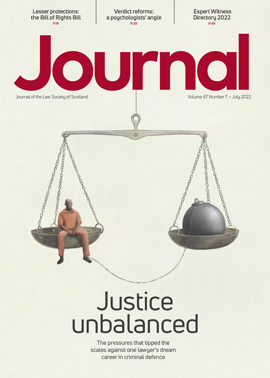Know people, know business
At the CIPD Festival of Work conference last month, its president, Baroness Ruby McGregor-Smith, said that people professionals need to be the driver of ESG targets in business. I agree. Businesses want to be more sustainable, socially responsible, and environmentally friendly. So, just as we stepped up during the pandemic, people professionals must now play a pivotal role in designing how workplaces will evolve due to ESG and continuous cultural change.
What is ESG?
ESG can be broadly broken down as follows:
Environmental – focuses on a business’s impact on things such as climate change, carbon emissions, pollution levels and responsible waste management.
Social – focuses on a business’s impact on its people, issues such as gender, diversity and inclusion (“D & I”), mental health, employee rights and working conditions, and its corporate social responsibility (“CSR”) programmes.
Governance – focuses on the running of, and trust and transparency across, the business.
Why is ESG relevant to the legal profession?
ESG considerations are slowly, but surely, working their way into the legal profession. First, ESG is an area where lawyers are advising on things such as environmental law, responsible investment funds and sustainability-linked loans. Secondly, clients consider ESG a key priority for their own business and want to ensure their legal providers are operating under trustworthy ESG credentials. Finally, not only are staff increasingly interrogating their employer’s ESG focus to help decide whether they want to continue to work there, it is equally important to prospective hires when deciding where they want to work.
Essentially, a legal organisation’s ESG performance can assist with attracting clients, talent, and investment, which can ultimately affect its financial performance.
Where do “people professionals” fit in?
Since the pandemic, the focus on ESG matters in workplaces has moved from the environmental impact to social issues which are naturally linked to matters that HR professionals, like me, deal with daily. It is no longer enough for firms simply to deliver a bit of pro bono legal advice and carry out some charitable endeavours.
What matters as regards “social” ESG targets?
Pay and working conditions – these are key when looking at the social strand of ESG, particularly in the current climate. Organisations are increasingly investing time and money into recruitment, fair wages and enhancing terms and conditions to ensure their people are looked after. Job applicants assess pay, benefits and career progression to help gauge what value is placed on the workforce. This forces employers to be more transparent and accountable in these areas.
Policies and procedures – implementation of disciplinary and grievance, whistleblowing and equal opportunities policies sits firmly within HR teams. Such policies assist in preventing and tackling issues of discrimination, bullying and harassment, ultimately leading to a fairer workplace.
D & I – a diverse workforce, with a range of different perspectives, results in a wide mix of skills and experience and, in my experience, leads to greater employee engagement and retention. Legal organisations that have D & I prominent on the business agenda are more likely to see a positive influence on their reputation as well as success with clients, which positively impacts on fees.
Mental health and wellbeing – for many, extended lockdowns and isolation during the pandemic created, or exacerbated, mental health issues. As a result, much of the Scottish legal profession is now more focused than ever on creating collaborative working environments promoting health and wellbeing. By doing so, employees are more likely to be productive and engaged, leading to better performance, reduced staff turnover and less sickness absence. At MacRoberts, the appointment and training of designated mental health first aiders (MHFAs), who can be the first point of contact for any employees who are struggling with their mental health, has proven incredibly useful.
Learning and development – it is vital for employees, particularly managers, to get effective training providing them with skills that enable them to identify and deal with issues such as stress, anxiety and discrimination at an early stage, and in an open manner – before matters escalate to the stage where team members simply leave.
CSR programmes – in addition to the above, it remains vital to maintain strong community links and to “give back” wherever possible – whether that is via pro bono legal advice or setting aside staff volunteer days for causes that are close to their hearts. Employees feel extremely motivated when they view the corporate brand as one with a social conscience.
The future
Competition is helping to incentivise those within the Scottish legal profession to do better when it comes to ESG, particularly when they realise it gains rewards from employees, attracts talent and clients, and hits the profitability angle too. The role of “people professionals” in aligning corporate culture and human values to create safe, fair and more sustainable workplaces is invaluable. As British-American author and inspirational speaker, Simon Sinek says: “If you don’t know people, you don’t know business.”
Perspectives
Features
Briefings
- Civil court: Issues on appeal
- Licensing: Minimum pricing – a genuine impact?
- Insolvency: How to admit joint creditor claims
- Tax: windfall and plastic packaging taxes raise stakes
- Immigration: Asylum system overhauled
- Scottish Solicitors' Discipline Tribunal: July 2022
- In-house: In with the stonework
- Property: Living with the Register of Overseas Entities
In practice
- OPG update: July 2022
- Public policy highlights: July 2022
- Gear up for the Scottish Legal Walks
- Disabled solicitor support group proposed
- Risk: Cybercrime – the hybrid worker prey
- Ask Ash: Piling it on
- TRS: time for a trusts trawl
- Know people, know business
- High street and hybrid
- Appreciation: Ian Leslie Shaw Balfour
- The Expert Witness Directory 2022
- Expert witness: case law update







